In the EU-funded "AI4Cities" project, leading European cities such as Amsterdam, Helsinki and Stavanger are coming together to search for solutions based on artificial intelligence (AI) for decarbonization in the areas of mobility and energy. For many cities, district heating is a central pillar in their decarbonization strategy. Continuous and automated monitoring of district heating substations can ensure energy-efficient and economical operation of district heating networks. With the help of Symvio's software solution, which is being developed in the AI4CITIES project together with Fraunhofer ISE, utilities and clients such as technical municipalities can better monitor and optimize the operation of their district heating connections and thus reduce energy consumption and save CO2. | Duration: 04/2021 - 03/2022
more infoResearch Projects
-
BIM4Ren – BIM Tools and Services for Buildings
User-friendly Building Information Modeling (BIM) Tools and Services for the Refurbishment of Buildings and the Renewal of Building Technology
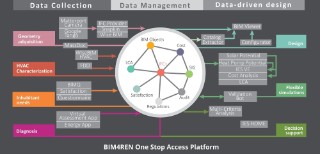
Overview of the BIM4REN tools and their workflow.
The construction sector is one of the most relevant areas when it comes to saving energy and reducing emissions. In this industry, large international companies coexist with SMEs, which account for 92 percent of the market. Although they represent 9 percent of the GDP of the European Union, digitalization in this sector exists only to a limited extent. In this context, the EU-funded project BIM4REN aims at the development and demonstration of user-friendly Building Information Modeling (BIM) tools and services in the field of building refurbishment and renewal. The project brings together 23 stakeholders from research institutes, universities, and small and large industrial companies in the construction sector. | Duration: 10/ 2018 - 09/2022
more info -
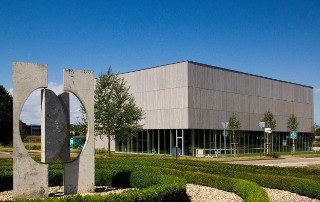
The Regional Innovation Center for Energy Technology (RIZ Energie) at Offenburg University of Applied Sciences.
The construction industry has been dealing with Building Information Modeling (BIM) for several years. While this method is increasingly used in architectural offices for optimized planning, BIM methods are only slowly finding their way into the planning of technical building equipment , the execution and the operational phase of buildings. The research project "BUiLD-DIGITiZED" develops BIM methods for the commissioning and operational optimization of technical building equipment systems and demonstrates them on a lowest-energy building. In this way, the project provides an impetus for the broad application of BIM methods from design planning through execution to commissioning. This allows for BIM methods to be used in a targeted manner to significantly improve workplace quality and energy efficiency. | Duration: 07/2020 - 06/2023
more info -
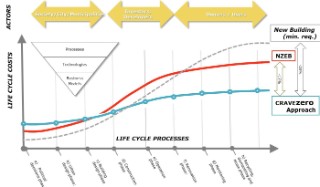
Costs reduction potentials in building life cycle (CRAVEzero Approach).
Cost optimal and nearly zero energy performance levels are principles initiated by the European Union’s (EU) Energy Performance of Buildings Directive, which was recast in 2010. These will be major drivers in the construction sector in the next few years, because all new buildings in the EU from 2021 onwards are expected to be nearly zero energy buildings (NZEBs). | Duration: 09/2017 - 08/2020
more info -
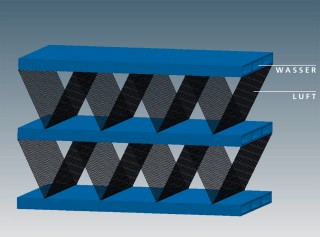
A schematic draft design of a heat exchanger structure developed in the ”EffiMet“ project.
Initial investigations of heat exchangers which use woven or knitted meshes of metal wire as the heat transfer structure have demonstrated a large potential for mass reduction and energy saving. In the ”EffiMet” joint project, which is supported within the ”KMUInnovativ Programme” of the German Federal Ministry of Education and Research (BMBF), Fraunhofer ISE is cooperating with Visiotex GmbH, Hattler & Sohn GmbH and Fraunhofer IFAM in Dresden to investigate the theoretical background, identify technical implementation routes and implement the results with selected typical components. The results from one of the constructed components show that about 50 % of the material needed to increase the surface area can be saved for the same energy efficiency values. Correspondingly, the energy efficiency can be raised while keeping the amount of material used constant. | Duration: 09/2011 - 08/2014
more info -
Efficient Heating
Systematic Investigation and Evaluation of the Economic and Environmental Sustainability of Solar-Based Renewable Heating Systems in Comparison with Alternative Systems.
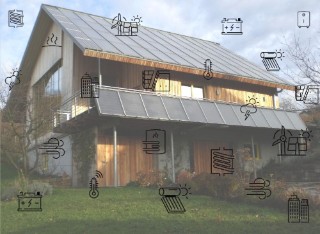
For the provision of heat in residential buildings, there are numerous numerous options available that must be compared by the consumer. must compare them.
More and more consumers and investors want heating systems that are both sustainable and economical. To date, there is no uniform data and model basis for evaluating technologies across all technologies. This is essential for consumers' investment decisions as well as sustainable product development by manufacturers and the optimal coupling of different heating technologies. The »Efficient Heating« project aims to close this gap and provide a methodology for the comparable ecological and economic evaluation of different heating systems and define suitable data formats. In addition, reference heating systems and scenarios for single-family and multi-family houses in various states of renovation will be developed. | Duration: 07/2022 - 12/2025
more info -
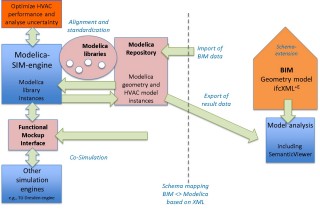
Schematic presentation of the BIM Modelica interface to be developed, as well as of coupling to other tools using the Functional Mockup Interface (FMI) and to sensitivity and uncertainty analysis methods.
In the collaborative EnEff-BIM project, information technology methods for planning, design, and operation of energy-efficient new and existing constructions are developed, tested, and made available to expert planners. Modelling, simulation, and operating optimization is based on open digital building information models (BIM). Based on a digital 3D planning model, a continuous data exchange should be achieved. The objective of the project is the development of an open interface for the automatic generation of Modelica sub-models based on BIM data. The Modelica interface to be developed also offers a basis for life cycle cost analyses, energy performance verification, and sustainability certification of buildings. | Duration: 12/2013 - 11/2016
more info -
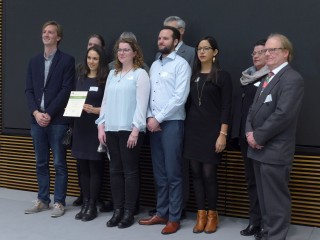
Award ceremony of the ideas competition for an international energy efficiency competition.
The Federal Government's Energy Efficiency Strategy for Buildings (Energieeffizienzstrategie Gebäude, ESG) is based on the goal of making the building stock virtually climate-neutral by 2050. To this end, the non-renewable primary energy demand is to be reduced by a combination of energy saving and the use of renewable energies by the year 2050 in the order of 80% compared to the year 2008. This ambitious task can be accomplished by accelerating the implementation of innovations, new technologies and concepts, and the transfer of findings from many years of research. With the funding initiative "EnEff.Gebäude.2050" within the framework of the ESG, the transfer of research results to a broad impact is to be initiated and accelerated in a targeted manner. The project accompanies this transfer from research to the broad field. | Duration: 07/2017 - 12/2019
more info -

The heating and cooling supply systems of buildings are usually documented in schematics. These documents contain important information about the topology and the components of the systems that are useful for designers, building managers, and technical monitoring service providers along the complete building life cycle. However, these schematics are often only available in paper form, as CAD or pdf files and the information that they contain is almost not accessible digitally. This situation makes the data collection tedious and hampers the efficiency and cost-effectiveness of refurbishment or a technical monitoring projects. | Duration: 01/2023 - 12/2025
more info -
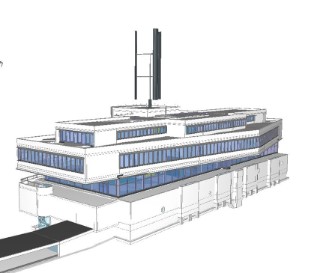
3D view of the Viega seminar center as a BIM model.
The digitalization of the building sector is a central element for reaching the energy transformation goals. In this project, we aim at establishing an integral systematic for linking the domains building services engineering and building information modelling (BIM) in order to safely achieve highly energy-efficient buildings. Within the project we demonstrate the developed approaches in the planning and operation phase of a real plus-energy building. | Duration: 12/2018 - 11/2021
more info
